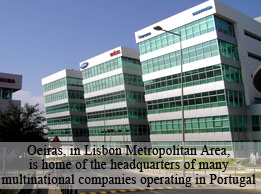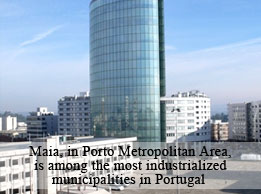ADVERTISEMENT
|
|
|
Portugal Travel & Tourism Guide
Economy of Portugal
NextGen Day offers travel tips and information for top travel places and best destinations in Africa, Asia, Australia, Europe, Middle East and United States of America. We feature Asia links, Asia resources and large selection of Asia budget airlines, Asia chartered planes, Asia sea cruises, Asia ferries, Asia travel agencies, Asia land transports and Asia attractions including Asia beaches, Asia medical tourism, Asia retirement homes, Asia historical and Asia pilgrimage tours.
 Portugal's economy is based on services and industry such as software and automotive. Business services have overtaken more traditional industries such as textiles, clothing, footwear, cork and wood products and beverages. The country has increased its role in the automotive, mold-making and software sectors. Services, particularly tourism, are playing an increasingly important role. Portugal's European Union funding will be cut by 10%, to 22.5 billion euros, during the 2007–2013 period. EU expansion into eastern Europe has erased Portugal's past competitive advantage and relative low labor costs. Portugal's economic development model has been changing from one based on public consumption and public investment to one focused on exports, private investment, and development of the high-tech sector. At present, Portugal is exporting more technology than it imports. Portugal's economy is based on services and industry such as software and automotive. Business services have overtaken more traditional industries such as textiles, clothing, footwear, cork and wood products and beverages. The country has increased its role in the automotive, mold-making and software sectors. Services, particularly tourism, are playing an increasingly important role. Portugal's European Union funding will be cut by 10%, to 22.5 billion euros, during the 2007–2013 period. EU expansion into eastern Europe has erased Portugal's past competitive advantage and relative low labor costs. Portugal's economic development model has been changing from one based on public consumption and public investment to one focused on exports, private investment, and development of the high-tech sector. At present, Portugal is exporting more technology than it imports.
Portugal changed its political regime in 1974 due to the Carnation Revolution, culminating with the end of one of its most notable periods of economic growth, which had started in the 1960s. It left the EFTA and joined the European Union in 1986. These changes resumed a process of fast modernization and economic growth within the framework of a stable environment. Successive governments implemented reforms and privatized many state-controlled firms and liberalized key areas of the economy.
Portugal was one of the founding countries of the euro in 1999, and therefore is integrated into the Eurozone. Major industries include oil refineries, automotive, cement production, pulp and paper industry, textile, footwear, furniture, and cork. Manufacturing accounts for 33% of exports. Portugal is the world's fifth-largest producer of tungsten, and the world's eleventh-largest producer of wine. Agriculture and fishing no longer represents the bulk of the economy. However, Portugal has a strong tradition in the fisheries sector and is one of the countries with the highest fish consumption per capita. Portuguese wines, namely Port Wine and Madeira Wine, are exported worldwide. Tourism is also important, especially in mainland Portugal's southernmost region of the Algarve and in the Atlantic Madeira archipelago.
 The Global Competitiveness Report for 2005, published by the World Economic Forum, placed Portugal's competitiveness in the 22nd position, but the 2008-2009 edition placed Portugal in the 43rd position out of 134 countries and territories. The Global Competitiveness Report for 2005, published by the World Economic Forum, placed Portugal's competitiveness in the 22nd position, but the 2008-2009 edition placed Portugal in the 43rd position out of 134 countries and territories.
Research about quality of life by the Economist Intelligence Unit's quality of life survey placed Portugal as the country with the 19th-best quality of life in the world for the year 2005, ahead of other economically and technologically advanced countries like France, Germany, the United Kingdom and South Korea, but 9 places behind its only neighbour, Spain. This is despite the fact that Portugal remains the country with the lowest per capita GDP in Western Europe and is among the less wealthy in the European Union.
GDP growth in 2006, at 1.3%, was the lowest not just in the European Union but in all of Europe. In the 2000s, the Czech Republic, Greece, Malta, Slovakia and Slovenia have all overtaken Portugal in terms of GDP per head. And Portuguese GDP per head has fallen from just over 80% of the EU 25 average in 1999 to just over 70% in 2007. This poor performance of the Portuguese economy was explored in April 2007 by The Economist which described Portugal as "a new sick man of Europe". From 2002 to 2007, the unemployment rate increased 65%.
Major State-owned companies include Águas de Portugal, Caixa Geral de Depósitos , Comboios de Portugal , CTT and Rádio e Televisão de Portugal (media). Publicly owned companies like EDP, Galp, Jerónimo Martins, Millennium bcp, Portugal Telecom and Sonae are among the largest corporations of Portugal by both number of employees and net income. Most of these large companies are listed on the stock exchange. The major stock exchange of Portugal is the Euronext Lisbon which is part of the NYSE Euronext, the first global stock exchange. The PSI-20 is Portugal's most selective and widely known stock index. Portugal's central bank is the Banco de Portugal, which is an integral part of the European System of Central Banks.
Source: Wikipedia Encyclopedia
Portugal Hotels
<1> <2> <3> <4> <5> |

 Portugal's economy is based on services and industry such as software and automotive. Business services have overtaken more traditional industries such as textiles, clothing, footwear, cork and wood products and beverages. The country has increased its role in the automotive, mold-making and software sectors. Services, particularly tourism, are playing an increasingly important role. Portugal's European Union funding will be cut by 10%, to 22.5 billion euros, during the 2007–2013 period. EU expansion into eastern Europe has erased Portugal's past competitive advantage and relative low labor costs. Portugal's economic development model has been changing from one based on public consumption and public investment to one focused on exports, private investment, and development of the high-tech sector. At present, Portugal is exporting more technology than it imports.
Portugal's economy is based on services and industry such as software and automotive. Business services have overtaken more traditional industries such as textiles, clothing, footwear, cork and wood products and beverages. The country has increased its role in the automotive, mold-making and software sectors. Services, particularly tourism, are playing an increasingly important role. Portugal's European Union funding will be cut by 10%, to 22.5 billion euros, during the 2007–2013 period. EU expansion into eastern Europe has erased Portugal's past competitive advantage and relative low labor costs. Portugal's economic development model has been changing from one based on public consumption and public investment to one focused on exports, private investment, and development of the high-tech sector. At present, Portugal is exporting more technology than it imports. The Global Competitiveness Report for 2005, published by the World Economic Forum, placed Portugal's competitiveness in the 22nd position, but the 2008-2009 edition placed Portugal in the 43rd position out of 134 countries and territories.
The Global Competitiveness Report for 2005, published by the World Economic Forum, placed Portugal's competitiveness in the 22nd position, but the 2008-2009 edition placed Portugal in the 43rd position out of 134 countries and territories.